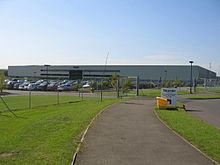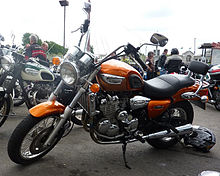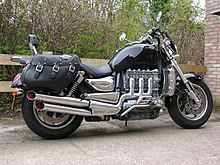-20%
PATCH - Union Jack - TRIUMPH
Artikelnummer: AE.PATCH-423Stitch it on your vest or jacket!
Also possible to iron it to your clothing
BADGE-PATCH
approx. 12,5 x 3,5 cm
Triumph Motorcycles Ltd is the largest British motorcycle manufacturer, established in 1984 by John Bloor after the original company Triumph Engineering went into receivership. The new company (initially Bonneville Coventry Ltd) continued Triumph's record of motorcycle production since 1902. During the 12 months preceding June, 2012, Triumph sold 49,000 motorcycles, and employed 1,600 staff.[1]
The Triumph Motorcycle Factory at Hinckley
Contents
History[edit]
Triumph 1200 cc Trophy from the original 1991 model range
When Triumph Engineering went into receivership in 1983, John Bloor bought the name and manufacturing rights from the Official Receiver.[2] The new company's manufacturing plant and designs were outdated and unable to compete against the Japanese, so Bloor decided against relaunching Triumph immediately. Initially, production of the old Bonneville was continued under licence by Les Harris of Racing Spares, in Newton Abbot, Devon, to bridge the gap between the end of the old company and the start of the new company. For five years from 1983, about 14 a week were built at peak production. In the USA, owing to problems with liability insurance, the Harris Bonnevilles were never imported.[3]
Triumph 900 cc Adventurer, first variation of the popular Triumph Thunderbird 900 triple
Bloor set to work assembling the new Triumph, hiring several of the group's former designers to begin work on new models. The team visited Japan on a tour of its competitors' facilities and became determined to adopt Japanese manufacturing techniques and especially new-generation computer-controlled machinery. In 1985, Triumph purchased a first set of equipment to begin working, in secret, on its new prototype models. By 1987, the company had completed its first engine. In 1988, Bloor funded the building of a new factory at a 10-acre (40,000 m2) site in Hinckley, Leicestershire.[4] Bloor put between £70 million and £100 million into the company between purchasing the brand and breaking even in 2000.
At the same time as production capacity increased, Bloor established a new network of export distributors. He had previously created two subsidiary companies, Triumph Deutschland GmbH and Triumph France SA. In 1994, Bloor created Triumph Motorcycles America Ltd.[4]
At 21:00 on 15 March 2002, as the company was preparing to celebrate its 100th anniversary as a motorcycle maker, its main factory was destroyed by a fire which began at the rear of the facility. At the height of the blaze, over 100 firefighters were tackling the fire, which destroyed most of the manufacturing capacity.[5] Nevertheless, the company, which by then employed more than 650, quickly rebuilt the facility and returned to production by September that year.
In May 2002, Triumph began construction on a new sub-assembly manufacturing facility in Chonburi, Thailand to make various components.[6] A second factory was opened in 2006 by Prince Andrew, Duke of York where a wet painting facility and assembly line have been established.[6][7] A third factory was opened in 2007 to include high pressure die-casting and machining, and Triumph announced that they were expanding to increase capacity to over 130,000 motorcycles.[8] Triumph Motorcycles (Thailand) Limited is a 100% UK owned company and now employs about 1000 staff.[6]
The Triumph Group announced sales of 37,400 motorcycles in the financial year ending 30 June 2006. This represented a growth of 18% over the 31,600 produced in 2005. Company turnover (revenues) rose 13% to £200 million ($370 million), but net profit remained static at around £10.3 million due to recent investment in production facilities.[9] In June 2009 Digby Jones, Baron Jones of Birmingham, the former Minister of State for Trade, became chairman of Triumph motorcycles (Hinckley) Ltd and the 1,600 cc (98 cu in) Thunderbird twin-cylinder cruiser was announced.[10]
The Group turnover increased by 11% from £312.4 million in 2010 to £345.3 million in 2011 and unit sales of motorcycles increased by 7% from 45,501 to 48,684. This increase in unit sales can be largely attributed to the introduction of incremental models to the range. The operating profit before interest and tax grew from £15.1 million to £22.3 million due to strong sales of motorcycles and related products, benefitting from improved use of working capital and continued focus upon the cost base. During 2011 Triumph launched three new motorcycles: the Tiger Explorer, Speed Triple R and the Steve McQueen Special,[11] successfully bucking the trend of the global downturn in motorcycle sales.[12]
Model range[edit]
Mid-1990s Triumph Trophy tourer with the 900 cc triple engine. The small Union flag was then a standard feature on all Triumphs except the Thunderbird.
TT600
A range of new 750 cc and 900 cc triple-cylinder bikes and 1000 cc and 1200 cc four-cylinder bikes were launched at the September 1990 Cologne Motorcycle Show. The motorcycles used famous model names from the glory days of Meriden Triumph and were first made available to the public between March (Trophy 1200 being the first) and September 1991. All used a modular liquid-cooled DOHC engine design in a common large diameter steel backbone frame. The modular design was to ensure that a variety of models could be offered whilst keeping production costs under control—an idea originally put forward, in air-cooled form, in the early 1970s by Bert Hopwood but not implemented by the then BSA-Triumph company.
The first models, known generically as the T300s, all used a common piston diameter (76 mm) in a common wet cylinder liner. Basic engine variations were achieved through the use of two specifications of piston stroke: 65 mm to create individual cylinder capacity of 300 cc, and 55mm to create a 250 cc individual cylinder. Two 750 cc models were released – and the Daytona and Trident 750 triples (3 x 250 cc). There was one 1000 cc model – the Daytona 1000 four (4 x 250 cc). Two 900 cc models were the Trophy 900 and Trident 900 triples (3 x 300 cc). The Trophy 1200 four was the largest model (4 x 300 cc). All were remarkably smooth running. The three cylinder models were equipped with a contra-rotating balance shaft mounted at the front of the engine. The four cylinder models benefitted from twin balance shafts – unique at the time – mounted beneath the crank shaft. Contemporary road tests noted the solidity and smoothness of performance as positives but the weight of the machines as negatives. For brand new machines produced by a totally new concern, there were remarkably few early problems. These were an insecure oil pressure switch and a longer-lived problem with the starter (or sprag clutch). The cosmetic finish on the first machines was simple and not very robust. Revisions to crankcases for the three-cylinder models in 1993, together with a move to high pressure casting, reduced engine weight considerably. All painting and plating operations were brought in house in 1993, as the Hinckley factory benefitted from further investment after the initial success of the range. The result was improved quality and durability of finish, added to the basic engineering integrity of the engine and chassis, made for a long-lasting and robust motorcycle.
The range was largely revised in 1997 with the release of the T500 range, followed by a light-weight four-cylinder 600 cc sports TT600. The 600 was a major design departure and initially received a poor press: "unpleasant at low revs due to a lethargic and unpredictable throttle response, with anonymous styling".[13] As sales built, the big fours were phased out of the lineup and parallel twins and triples became the marketing and development focus of Triumph's marketing strategy. Triumph also decided to exploit demand for retro motorcycles with modern engineering. The Triumph Thunderbird 900 exploited the styling cues of the 'old' Triumphs legendary designer, Edward Turner whilst retaining the modern triple engine. The 790 and 865 cc versions of the Triumph Bonneville and Thruxton look and sound original but internally they have modern valves and counterbalance shafts.
2014 Triumph Street Triple R.
The Triumph Rocket III - the largest-engine production motorcycle in the world.
For their contemporary range, the triple is Hinckley Triumph's trademark, filling a niche between European and American twins and four-cylinder Japanese machinery. The 2,294 cc (140.0 cu in) triple Rocket III cruiser was introduced in 2004. The first 300 Rocket III models were already sold before they were produced, and there was a long waiting list for Rockets into 2005.[14]
On 21 July 2008, Triumph held a Global Dealer Conference where new models for 2009 were launched, including the official announcement of the parallel twin-cylinder Thunderbird.[15]
Triumph's best selling bike is the 675 cc Street Triple. In 2010 they launched the Triumph Tiger 800 and Tiger 800 XC, dual-sport motorcycles, which uses an 800 cc engine derived from the Street Triple, and is designed to compete directly with the market leading BMW F800GS.[16] In 2012, the Tiger 800 was joined by the shaft-driven Triumph Tiger Explorer.
The 2015–2017 model range comprises:
- Adventure and touring
- Trophy SE ABS
- Tiger 800
- Trophy
- Cruisers
- America & Speedmaster
- Rocket III
- Thunderbird
- Modern Classics
- Bonneville
- Bonneville T120
- Street Twin
- Street Scrambler
- Thruxton
- Scrambler
- Roadsters and supersports
- Daytona 675
- Speed Triple
- Street Triple
Further information: List of Triumph motorcycles
Triple Connection and celebrity marketing[edit]
2012 Triumph Bonneville T100 Special Edition Steve McQueenmotorcycle sought to replicate style of McQueen's 650 cc Triumph TR6 Trophy used in the film The Great Escape.
In 1995, the Triple Connection clothing range and the accessories range of products were launched.[4] Triumph made a commercial decision to design all their own motorcycle clothing rather than license other producers.[18] In the 21st century, Triumph marketed lines of clothing highlighting their association with celebrities strongly associated with the old Triumph marque such as Marlon Brando,[19] Bob Dylan, James Dean,[20] Elvis Presley[21] and particularly, Steve McQueen, for whom the company named a special edition of their Bonneville motorcycle.[22]













